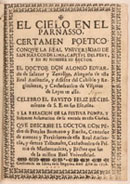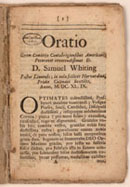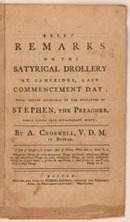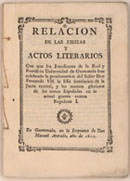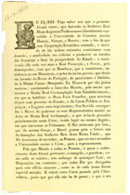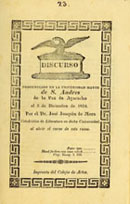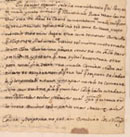 |
||
Colleges and universities, in the New as well as the Old World, were ritual spaces. A remarkable amount of the festive and theatrical dimension of higher education survives in published traces. |
||
“Festive pomp and solemn acclamation” Pedro de Paralta Barnuevo, a Lima polymath and sometime Rector of San Marcos University, published this account of the “festive pomp and solemn acclamation” with which the university welcomed the newly arriving viceroy, the Marques de Villagarcia. Perhaps to prove to the viceroy that this university on the Pacific coast was as sophisticated as any in Spain, the faculty competed with one another to honor him with Spanish and Latin poetry. |
 |
|
An oration |
||
“The art of buffoonery is not one of the liberal arts” Since medieval times, commencement exercises had often included a comic interlude or farce. This critic, however, was disturbed by the comedy that had concluded Harvard’s commencement ceremony in 1771. In honor of the three professions which universities traditionally trained, the play had included a lawyer, a physician, and an over-zealous clergyman. This author was shocked that the commencement (held in church) had “made the House of God, to outdo the Play-houses, for vain laughter, and clapping,” and was horrified that young men preparing to enter the ministry themselves would mock the figure of the preacher. “The art of Buffoonery,” he protested, “is not one of the liberal arts… it ought to be nipped in the bud.” |
||
Political theater Universities were an important forum for marking and celebrating political events, such as the conclusion of a war or the birth of an heir to the throne. In 1808, Napoleon Bonaparte of France deposed Spain’s royal family and installed his own brother on the throne, sparking a broad-based popular uprising. The Junta Central, established by the insurgents to coordinate popular resistance to the French occupation, proclaimed the sovereignty of King Ferdinand VII, son and heir of the previous king, and who now languished under confinement in France. The University of Guatemala celebrated the proclamation with festivities and literary readings, just as if the new king was actually in power. |
 |
|
Coimbra comes to Rio In 1816, the Portuguese king Dom João was crowned as king – in Rio de Janeiro, not Lisbon. Seven years earlier the Portuguese royal family had fled from Napoleon’s invasion of Portugal, moving the royal court to Brazil, from where they ruled what they now called the United Kingdom of Portugal, Brazil, and the Algarves. They remained there even after Napoleon’s defeat in 1815. When João succeeded his father to the throne, he issued a special license for the University of Coimbra in Portugal to send representatives to the coronation. Colonial Brazil never had a university of its own, in part because Coimbra, to which all the colonial elite went, was in a sense the university of Brazil – just as Rio was now the capital city of Portugal. |
 |
|
Most fertile in interesting studies Nine years after Independence, the professor of literature in the University Mayor de San Andrés in La Paz, Bolivia, welcomed his incoming students with a stirring address: “Above all, gentlemen, the century in which you have been born, the fatherland which gave you being, indicate to you the legitimate scene of your labors … [In] a country which offers to understanding and reason the field most fertile in interesting studies, observe there the immense career which Providence opens on the soil of Bolivia, to the works of Literature.” |
 |
|
And, finally, everybody hated the food Around the year 1775, students in the Real Convictorio Carolino, a college in Chile, were so outraged by their conditions that they addressed a petition to the viceroy. The headmaster, they complained, was arbitrary, tyrannical, and miserly. Worst of all was the quality of the food. Meat, eggs, vegetables, all were meager, spoiled, or half-cooked. The students had to bribe the servants to get their evening cocoa. The very worst meal of all was a dogfish (tollo, a kind of shark) so rotten that the smell permeated the house. “In one of the courtyards closer to the kitchen and pantry, the children could not study without feeling queasy due to the stench that penetrated even the walls, and was transmitted by the water from the drain. The pantry steward, despite his Rusticity, and humble condition…, said that if the dogfish did not end his life while it remained in his pantry he would judge himself to be immortal.” [Thanks to former JCB Fellow Ari Zighelboim for bringing this document to light.] |
||
| Back to the beginning. | ||
To read the entire scanned book, go to the John Carter Brown Library's Internet Archive book at this link. |
||
| the Exhibition may be seen in the reading room from April 2014 through october 2014. |







